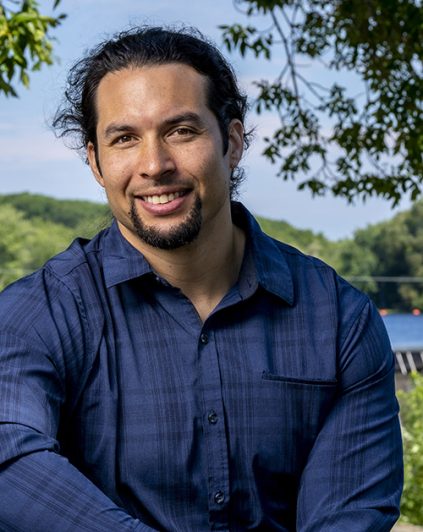Anthony Sutton
Research Interests
- Wabanaki Foodways (and Fisheries)
- Food Sovereignty
- Land access and land return
- Indigenous Research Methods
- Storytelling
- Environmental Communication
- Rhetoric
Research Projects
Resources
- News, Aug. 26, 2022 – Tony Sutton hired as assistant professor of Native American food systems
- Story April, 2022 – The Mudflat: Creating space and making connections to support shellfishing
- Mitchell Center Talk, Feb. 14, 2022 – Wabanaki Fisheries: What rivers can teach us about partnerships
- News Dec. 5, 2018: Tony Sutton – Diana Davis Spencer Scholar
Degrees
- University of Maine, Ph.D. (Ecology and Environmental Sciences)
- University of Maine, M.A. (Communication)
- Western Oregon University, B.A. (History)
Courses
- EES 398/598: Seminar in Sustainability Solutions
- CMJ 107: Environmental Communication
- CMJ 257: Business Communication
- IURC II: Undergraduate Research Team
- CMJ 103: Public Speaking
- CMJ 106: Storytelling
Profile
As a joint appointment in Native American Programs and Cooperative Extension, Tony supports food sovereignty for Wabanaki communities. This includes developing classes about indigenous knowledge and foodways, advising students engaging with tribal communities, and developing programming and or technical assistance for community food programs. Tony’s research connects history and indigenous research methods to inform collaborative contexts and critical attention to policy that shapes fisheries and food sovereignty in ways inconsistent with Wabanaki foodways.
Tony is also on the planning team for the Wabanaki Commission for Land and Stewardship (WCLS). The mission for the WCLS is to facilitate creating access to ancestral homeland territory to support land-based cultural practices while also creating formal processes for re-acquiring ancestral territory. The planning team’s role is to create the WCLS as a non-profit and centering priorities for each tribal nation. This includes outreach to other indigenous conservation groups, create access protocols between Wabanaki people and conservation groups; land transactions; and maintaining educational resources.
Prior to moving to his current position, Tony worked on the Maine Shellfish Learning Network, a collaboration that he maintains through his current position at the University of Maine. On this project, he engaged tribal nations, clammers, municipalities, research institutions, and state agencies to support the needs and future vision of the softshell clam fishery. His work included completing interviews with the diverse range of voices in the industry to develop a work plan; developing policy documents that identify barriers to Wabanaki clammers; reintegrating Wabanaki perspectives, knowledge, and values into The Mudflat website, technical documents, and through our newsletter that has a coast-wide audience of shellfish harvesters, science organizations, non-profits, and educational institutions.
Selected Publications
- Etsy-Kendall, J. and Sutton, A. W. (2022). A Study Regarding Implementation of Fishery Management Policies on Non-Indian Lands on the Quality and Quantity of Traditional Tribal Fish Stocks and the Impact on Sustenance Practices. Maine Indian Tribal State Commission Special Reports (accepted, under review)
- Sutton, A. W. (2022). Mahsusiyil: Generational learning from Passamaquoddy fiddlehead harvesters. In A. Calhoun, M. L. Hunter, and K. H. Redford (Eds.), Our Maine: exploring its natural heritage. Maine: Downeast (accepted, in production)
- McGreavy, B., Sutton, A. W., and Hillyer, G. (2022). Writing our way to coastal resilience: Engaged rhetorical field work for climate justice with/in small-scale fisheries. In S. I. Dobrin and M. Jones (Eds.), Rhetorical Ecologies. Illinois: National Council of Teachers of English. (accepted; under review)
- McGreavy, B., Ranco, D., Daigle, J., Greenlaw, S. Altvater, N., Quiring, T., Michelle, N., Paul, J. Binnette, M., Benson, B., Sutton, A. W., Hart, D. (2020). Science in Indigenous Homelands: Addressing Power and Justice in Sustainability Science from/with/in the Penobscot River. Sustainability Science, p. 937-947.
- Sutton, A. W., Lamkins, J., Nadeau, H., Thomsen, N., Willard, K., and Saber, D. (2020). Tackling Wicked Problems with Undergraduate Interdisciplinary Research: A Team Perspective. Journal of Conservation and Sustainability, 3.
- Sutton, A. W. (2018). Farming, Fieldwork, and Sovereignty: Addressing Colonialist Systems with Participatory Critical Rhetoric. In C. R. Kelly and J. E. Black (Eds.), Decolonizing Native American Rhetoric: Communicating Self-Determination. New York: Peter Lang.

